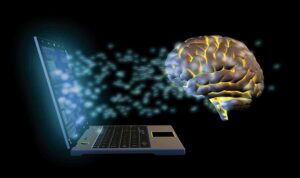In today’s digital age, technology has become an integral part of daily life, influencing how we communicate, work, and even relax . While the benefits of technology are undeniable, there is growing concern about its impact on mental health, particularly when it comes to excessive screen time and social media use. From increased feelings of anxiety to disrupted sleep patterns, the effects of overuse can be far-reaching. However, with awareness and proactive strategies, we can manage our digital well-being and maintain a healthy balance between our online and offline lives.
Exploring the Impact of Screen Time on Well-Being

The Rise of Digital Dependence
Technology is a big part of our daily lives, from phones and computers to smartwatches and social media. These tools make things easier and keep us connected, but they also come with some downsides. For example, studies show that many people spend hours each day looking at screens for work, fun, or social media. At first, too much screen time may seem okay. However, it can cause mental health issues later. In fact, going beyond the recommended limits can make things worse.
Mental Health Effects of Excessive Screen Time
Increased Anxiety and Depression

Excessive screen time, especially on social media, can increase anxiety and depression. Studies show that using Facebook, Instagram, and Twitter can make people feel lonely and isolated. Constantly comparing yourself to others’ perfect lives can harm self-esteem and mental health.
Sleep Disruptions

Another commonly reported issue is the disruption of sleep patterns due to technology use. The blue light emitted by smartphones and tablets interferes with the production of melatonin, a hormone responsible for regulating sleep. As a result, many people struggle to fall asleep or get good-quality sleep. This leads to daytime fatigue and increased stress.
Decreased Attention Span and Cognitive Fatigue

Technology can also impact cognitive function. Constant notifications, multitasking, and the need to check devices frequently can contribute to diminished focus and attention span. This phenomenon, called “cognitive overload,” makes it hard to focus on tasks. As a result, it causes mental exhaustion.
Social Isolation

Ironically, while technology is designed to connect people, it can also lead to increased feelings of social isolation. Many individuals, particularly younger generations, may replace face-to-face interactions with online communication. This shift from physical to digital connections can lead to fewer meaningful relationships. As a result, loneliness and weak community bonds can occur.
Managing Digital Well-Being

Although escaping technology completely may seem impossible, we can take steps to use it healthily. By using technology mindfully, we can reduce its negative effects on mental health. This helps us regain control over our digital lives.
- Set Boundaries and Limit Screen Time
One of the simplest ways to manage screen time is by setting clear boundaries. Designate specific times during the day for checking emails or scrolling through social media,and stick to them. Consider using apps that track and limit screen time to help enforce these boundaries. The goal is not to eliminate technology entirely but to regain control over its use. - Practice Digital Detox
Taking regular breaks from technology can have a profound impact on mental well-being. Designate one day each week or month as a “digital detox” day, where you disconnect from all devices for a set period. Use this time to engage in offline activities such as reading, exercising, or spending quality time with loved ones. A digital detox can help you recharge and restore a sense of balance. - Create a Healthy Sleep Environment
To improve sleep quality, try establishing a tech-free zone in the bedroom. Avoid using your phone or computer at least an hour before bed to allow your brain to wind down naturally. Instead, create a bedtime ritual that promotes relaxation, such as reading a physical book, journaling, or practicing meditation. - Use Social Media with Mindfulness
Social media platforms can be a source of anxiety, but they don’t have to be. Try following accounts that promote positivity, mental health awareness, and self-improvement. Curate your feed so that it aligns with your values and mental well-being. Additionally, be mindful of how much time you spend on these platforms and remember that it’s okay to unfollow or mute accounts that make you feel uncomfortable or inadequate. - Focus on Real-Life Connections
While online connections can be valuable, they shouldn’t replace face-to-face interactions. Make time for in-person meetings with friends, family, or coworkers, and prioritize building meaningful relationships offline. Engage in activities that foster genuine connections, such as joining a hobby group, volunteering, or participating in community events. - Practice Mindfulness Finally, practicing mindfulness can help you stay present and avoid getting caught in the endless cycle of digital distractions. Take a few minutes each day to meditate, focus on your breath, or engage in a mindful activity like walking or yoga. These practices can help you reconnect with the present moment and reduce the mental strain caused by constant digital stimulation.
Conclusion

In an increasingly connected world, it’s essential to recognize the impact that excessive screen time and social media use can have on mental health. While technology can enhance our lives, it’s important to approach it mindfully and set boundaries to protect our well-being. By adopting healthy habits such as limiting screen time, practicing digital detoxes, and focusing on real-world connections, we can find a balanced relationship with technology that supports both our mental health and overall well-being.
